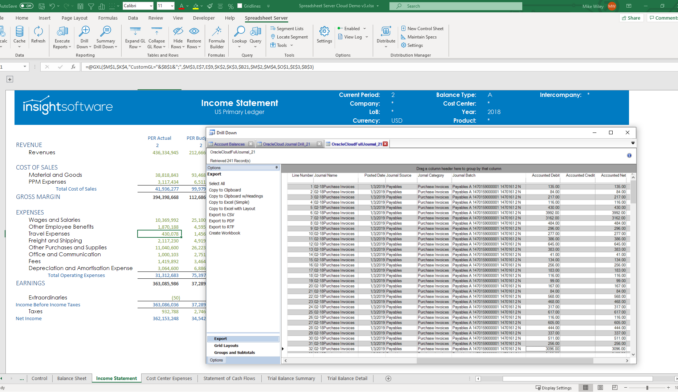Q&A Tuesday with Jina Etienne

Jina Etienne is the Founder/Consultant at Etienne Consulting and before that, she was Director of Diversity & Inclusion at Grant Thornton and former President & CEO of the National Association of Black Accountants. After spending more than two decades in public accounting, Etienne now focuses on enhancing enterprises through diversity, inclusion, technology, and strategic initiatives. We spoke with her about the benefits of diversity in the context of today’s rapidly-evolving accounting teams.
What are the benefits of having a more diverse workplace?
When we talk about diversity in the workplace, it conjures something different depending on your background. It could mean leadership diversity or it could refer to the diversity of opinions and perspectives. There’s been a lot of research recently trying to quantify the value of diversity. When you look at just gender diversity, having more female leadership leads to 21 percent better financial performance, according to McKinsey. We have enough data and tools at this point to start quantifying what diversity does instead of simply saying, “It makes people feel better.” On a human level, everyone knows diversity is better, but now we can prove it improves efficiency or raises the bottom line. The benefits aren’t abstract anymore.
What factors are still holding back workplace diversity?
Everyone has good intentions, but change is hard. So the fundamental challenge is changing the thinking. Increasingly, companies put someone in charge of this initiative, a Chief Diversity Officer or just a dedicated HR rep, which is a step in the right direction. But we’re not seeing companies try to holistically acquire diversity across the organization . . . for a few reasons. Some fail to fund it properly because they see diversity as something that affects employees and not clients. Others misunderstand how their organization needs to diversify, leading to ideas that sound great to executives, but look a lot different to employees.
Can technology play a role in cultivating diversity?
We are already seeing some interesting applications. For example, there are recruiting tools that help build diverse candidate pools by eliminating subconscious hiring biases. Companies have tried to do this in the past (the orchestra that asked performers to audition behind a curtain comes to mind), but human biases are so hardwired they’re almost impossible to overcome. Technology helps ensure our objectivity. It can also be used for analytics. When the HR department or executives have data about organizational diversity flowing into a dashboard, they’re able to track issues like pay disparity and team makeup closely instead of just getting an occasional update.
Could technology compromise diversity in any way?
Technology gives you the “what” but not the “why.” It’s a tool, but it can’t be the final arbiter, and there are some real risks to thinking we can automate diversity. For example, I heard about a project studying gender diversity that discovered the algorithm being used was built with only data from men. Basically, the algorithm couldn’t study diversity because it couldn’t understand the concept in the first place. The tech sector as a whole isn’t particularly diverse, so the diversity tools coming out of it might not be as enlightened as advertised. We always need to ask whether data and technology actually reinforce biases.
Are there ways to make companies more diverse without hiring anyone new?
Certainly. It starts with companies rethinking their own diversity. There are 17 different aspects of diversity (at least), and most companies are well represented in some and not in others. They may be lacking in terms of ethnic diversity but doing well in terms of age or gender diversity. Or they could have more people with disabilities than they realize considering that many disabilities are invisible. So we can make our workplaces more diverse simply by looking at diversity differently. When we start to think of diversity as being fundamentally about seeing and valuing differences, all organizations can improve at that without having to hire someone new.
Beyond becoming more diverse, how do finance and accounting teams need to adapt for the future?
It’s related to diversity, but in the context of process rather than people. Accountants are stereotyped as being reserved and unable to adapt, often because the work involves looking at so much historical data over and over. From that data, accountants gain a lot of insights into operations, strategy, and impact. So I think about diversity in the context of going beyond traditional accounting roles and looking at what we can offer in terms of advice, feedback, and insights. That’s going to require us to get outside our comfort zone in terms of the processes we rely on and the input we add to the organization. We should also be advocating for the organization to become data-driven and to let the information from the accounting system tell a story and inform future decision making.
How can accountants adapt to fast-changing roles and responsibilities?
They need to be generally thinking from the perspective of technology and ensuring they’re using the most current technology, even if that involves a change in process. In a previous role, I remember transitioning to a new accounting system, and there was a lot of effort put into adapting the system so that we as an organization didn’t have to change how we did things. It was obvious to me we should do the opposite: adopting the best-in-class processes built into the system as our own. We could optimize ourselves by adapting our processes around the technology.
Where does the CFO fit into this?
The CFO can drive these changes, especially in terms of pushing back against a C-suite that’s asking for numbers instead of actual insights. It’s going to be different at small organizations vs. Fortune 100 companies, but I think all CFOs have the obligation to go beyond the reports that have historically been shared and the processes that have historically been done and look for ways to bring new forms of insight and expertise to the forefront.
So it’s really about leveraging data as effectively as possible?
I think that data collection, tracking, optimization, and reporting is an integral part of accounting today in ways that it hasn’t been before. It’s revealing the difference between the insights we’ve historically been providing and the ones we should be providing. I think it can be used in ways that prove the value accountants bring to today’s organizations, especially when accountants apply the analytical skills they already possess.






